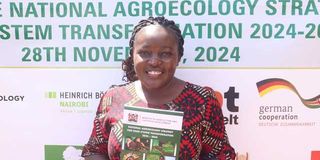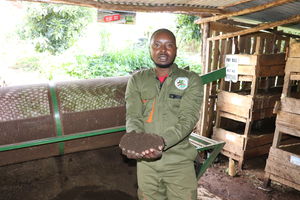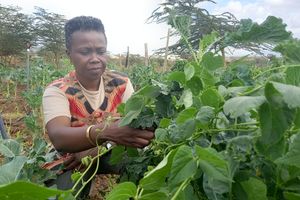
Rosinah Mbenya at the Kalro offices.
Rosinah Mbenya is the coordinator of Participatory Ecological Land Use Management (PELUM) Kenya, a network of 63 agencies. She speaks to Sammy Waweru on the importance of agro-ecology.
What is agro-ecology and how does it align with national farming policies?
Agro-ecology is farming that aligns with nature, applying ecological principles to manage interactions between humans, animals, plants and the environment. FAO highlights 10 key elements of agro-ecology, including diversity, efficiency and resilience.
Agro-ecology stresses governance, fairness and social values. It is a climate resilience strategy, backed by the 2021 National Agriculture Policy and the 2024 National Agro-ecology Strategy for Food Systems Transformation.
Murang’a, Kiambu and Tharaka Nithi counties have adopted agro-ecology policies, while others like Makueni, Busia, Vihiga and Laikipia are in the process.
How does agro-ecology differ from other sustainable farming practices?
Agro-ecology and sustainable farming promote environmentally-friendly and resilient agriculture, but differ in scope and focus. Agro-ecology is a holistic approach that integrates ecological, social and political dimensions, stressing biodiversity, soil health and community participation. It advocates for food sovereignty and social justice, empowering farmers and communities to shape policies and practices.
Sustainable farming focuses on reducing environmental impact by minimising chemical use, conserving water and improving soil health. Agro-ecology offers a comprehensive systems-based perspective, viewing farming as part of a larger societal and ecological framework. It is key to achieving sustainable soils, biodiversity conservation, climate resilience, strong cultural and dietary diversity and the empowerment of smallholder farmers.
What role does agro-ecology play in addressing food security, sustainability and environmental challenges?
Agro-ecology promotes sustainable farming that prioritises environment health, biodiversity and social equity. Through crop diversification, soil conservation and efficient water management, it fosters resilient food production while reducing reliance on chemical fertiliser and pesticides. This lowers costs for farmers and improves long-term soil fertility.
By valuing local knowledge and working with communities– especially smallholder farmers, women and marginalised groups – it strengthens self-reliance and reduces vulnerability to economic and environmental vagaries. Ultimately, it supports food systems, alleviates poverty and increases access to nutritious food.
Can agro-ecology be practised on a large scale?
It can be implemented on a large scale with thoughtful adaptation to commercial operations. Large farms can integrate practices like crop rotation, inter-cropping and agroforestry.
Finca las Nubes in Mexico, for instance, applies agro-ecological methods by combining shade-grown coffee with tree-planting.
Similarly, cooperative societies in Ecuador demonstrate how collective action enables small and medium-sized farms to share resources, knowledge and markets, fostering a resilient food system.
With proper management, sustainable investment and collaboration, agro-ecology can support large-scale food production while remaining environmentally and economically viable.
Can agro-ecology address the access to quality seeds challenge?
Agro-ecology prioritises seeds as a foundation of sustainable farming, emphasising locally adapted and indigenous varieties. By promoting seed sovereignty, agro-ecology helps farmers to save, exchange and breed their own seeds, reducing reliance on costly commercial alternatives and chemicals. Community seed banks and farmer-led exchanges support these efforts.
How long does it take for a farmer to transition to agro-ecological practices?
Many farmers have transitioned to agro-ecology, though timelines vary, depending on factors like farm size, support structures and local conditions. PELUM Kenya has been working with its members in Kiambu and Murang’a on projects since 2019. Farmers who have transitioned to agro-ecology have seen increased yields. The most important step is for farmers to commit to adopting organic practices. In dry regions, farmers should focus on water harvesting and grow drought-resistant crops. While smallholder farmers may experience initial yield declines, continued adoption of agro-ecology eventually leads to stabilised and improved harvests.
How can this help mitigate the effects of climate change?
Agro-ecology plays a role in combating climate change by promoting sustainable farming practices that reduce greenhouse gas emissions. Key strategies include carbon sequestration, conservation agriculture and cover cropping.
Agroforestry provides shade, improves soil fertility and stores carbon. It supports climate-resilient crops like drought-tolerant maize, millet and sorghum. By reducing reliance on chemical fertiliser and pesticides, agro-ecology enhances soil health. These approaches strengthen farming systems, making them more adaptable to climate shocks.
How accessible and affordable are bioinputs for agro-ecology?
Access to bioinputs like organic fertiliser, biopesticides and biological inoculants is improving but challenges persist regarding availability, affordability and awareness.
The Organic Fertiliser and Input Manufacturers Association of Kenya (OFIMAK) is raising awareness on sustainable alternatives from organic materials. OFIMAK also advocates for government and stakeholder support to promote these products.
The private sector is increasingly involved in the development of bioinputs. More investments and support are necessary to improve accessibility. Focus must also be on training farmers to produce bioinputs. This would enhance farmer autonomy.
Through our network multiplier, we have reached many small-scale farmers, providing knowledge and skills to strengthen their involvement in bioinput practices.
Can technology be integrated into agro-ecological practices, and what opportunities exist for innovation in this niche through research?
Technology plays a crucial role in advancing agro-ecology by supporting sustainable farming while preserving core ecological principles.
Drones, soil sensors, satellite imagery and other tools enable farmers to monitor crop health, soil conditions and pest populations, allowing for precise pest management and efficient resource use.
Mobile apps and digital platforms provide weather updates, market prices and educational resources, helping farmers make informed decisions.
Innovations in water management, such as drip irrigation and rainwater harvesting, enhance water use efficiency.
Additionally, technology that supports the production of biofertiliser and biopesticides offers sustainable alternatives to synthetic chemicals, promoting soil health and biodiversity.
PELUM Kenya and key partners held a national symposium on agro-ecology recently. What were the deliberations?
PELUM Kenya and like-minded partners organised the inaugural National Agro-ecology Symposium themed “Sustainable Futures: Advancing Agro-ecology for Climate Resilience and Food Sovereignty”.
The symposium aimed to foster dialogue on transitioning Kenya’s food systems towards sustainability.
There were more than 200 participants, including the government, academia, civil society, farmers, researchers, private sector players, development partners and consumers. Discussions emphasised the potential of agro-ecology in transforming Kenya’s food systems and called for action.
Key highlights included supporting participatory research and farmer-driven innovations for locally relevant data on the role of agro-ecology in climate resilience and food security; implementing Nationally Determined Contribution (NDC) targets for food system transformation; integrating agro-ecology into National Biodiversity Strategies and Action Plans (NBSAP); and working with other African nations to oppose harmful biotechnology.
The symposium also called for the banning harmful inputs that threaten seed sovereignty, biodiversity and cultural practices. It urged media to amplify awareness of agro-ecology as a pathway to equitable food systems.







